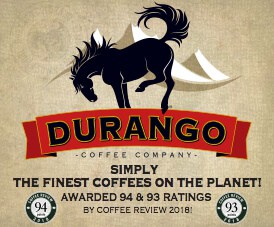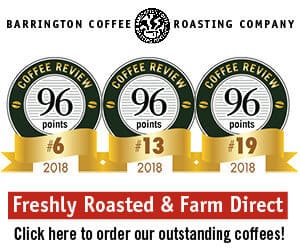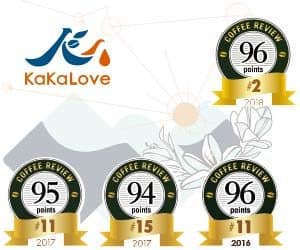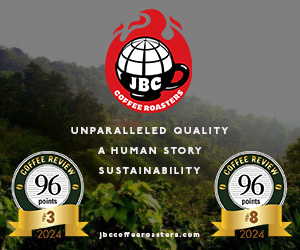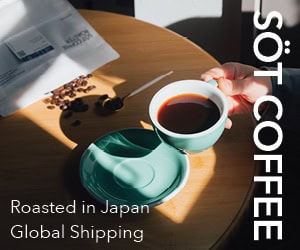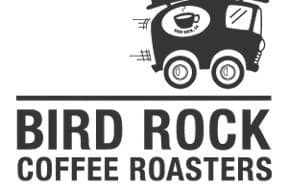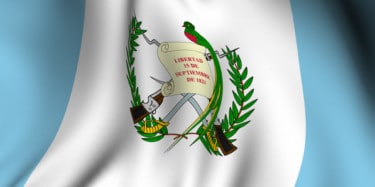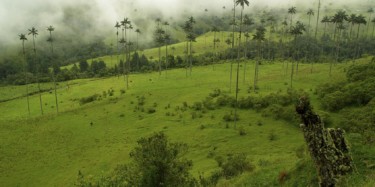Ulos Batak is the name applied by the cooperative exporter Klasik Beans to a premium grade of its small-producer wet-hulled coffee from the Lintong region south of Lake Toba. Lintong is one of the longest-established growing regions in Sumatra and arguably the most admired. Coffees from the northern part of the Indonesian island of Sumatra are valued for their complex earth and fruit notes that
SEARCH RESULTS
Esmeralda Leon Natural Geisha
This is an auction lot of the celebrated Gesha (also spelled Geisha) variety of Arabica from Hacienda La Esmeralda, the producer that first introduced the Gesha variety to the world. With its generally elongated beans and distinctive floral and crisp, often chocolaty cup, Gesha continues to distinguish itself as one of the world’s most unique coffees. This is a dry-processed or “natural” version,
Top 30 Coffees of 2014
We are pleased to present our Top 30 Coffees of 2014, Coffee Review’s second annual ranking of the most noteworthy coffees we reviewed over the past year. We selected and ranked these exceptional coffees and espressos based on quality (represented by overall rating), value (reflected by most affordable price per pound), and consideration of other factors that include distinctiveness of style,
Elida Estate Panama
A fine example of a “natural” or dry-processed coffee, meaning the beans were dried inside the fruit, encouraging a flavor profile that is sweeter and deeper-toned than the more familiar wet-processed coffees of Panama. Produced entirely from tree of the respected Catuai variety of Arabica. Elida Estate is one of Panama’s most distinguished farms. Based in the San Diego area, Bird Rock Coffee
Sumatra Ulos Batak
This exceptional coffee was selected as the #2 coffee on Coffee Review’s list of the Top 30 Coffees of 2014. Coffees from the northern part of the Indonesian island of Sumatra are admired for their complex earth and fruit notes that appear to result largely from unorthodox fruit removal and drying practices called “wet hulling.” This is a particularly refined example of the type. Based in the San
Washed Yirgacheffe
This is Lot #21 of this year’s production from the Alemu Washing station in Kochere. Yirgacheffe is a coffee region in southern Ethiopia that produces distinctive coffees from traditional varieties of Arabica long grown in the region. Yirgacheffe coffees like this one processed by the wet or washed method (fruit skin and pulp are removed before drying) typically express great aromatic complexity
Bird Rock Coffee Roasters
Recognized by Roast Magazine as Micro-Roaster of the Year in 2012, Bird Rock Coffee Roasters (BRCR) is proud to have helped put premiere coffee on the map in San Diego. A regular contributor to the international coffee industry, a frequent recipient of 93+ scores from Coffee Review and led by licensed Q-Graders, Bird Rock Coffee Roaster is sought after throughout the world for its coffee
Guji Zone Ethiopia
This exceptional coffee was selected as the #10 coffee on Coffee Review’s list of the Top 30 Coffees of 2014. A fine example of a “natural” or dry-processed coffee, meaning the beans were dried inside the fruit, encouraging a flavor profile that is sweeter and deeper-toned than the more familiar wet-processed floral- and citrus-toned southern Ethiopia profile. Based in the San Diego area, Bird
The Top 30 Coffees of 2013
View list of Top 30 Coffees of 2013 Coffee Review introduced 100-point reviews to the specialty coffee industry in 1997. Over the years since then we’ve cupped tens of thousands of samples and produced reviews for nearly 3,500 coffees. We are often asked, “What is the best coffee?” To which we give the obvious answer: “There is no single ‘best’ coffee.” Of course, visitors to our website
Lennette Kenya
This exceptional coffee was selected as the #22 coffee in the Coffee Review Top 30 Coffees of 2013. Produced entirely from the admired Kenya heirloom variety SL28. Despite grower discontent and urban encroachment on prime coffee lands, Kenya continues to produce some of the world's most elegant and distinctive coffees. Based in the San Diego area, Bird Rock Coffee Roasters is a retailer and
Ethiopia Natural Yirgacheffe
Yirgacheffe is a coffee region in southern Ethiopia that produces distinctive coffees from traditional varieties of Arabica long grown in the region. A “natural” or dry-processed coffee, meaning the beans were dried inside the fruit, encouraging a flavor profile that is lower-toned and more pungent than the more familiar wet-processed floral- and citrus-toned Yirgacheffe profile. Like virtually
El Injerto Geisha
A special auction lot from El Injerto, one of Guatemala’s most celebrated coffee farms, produced entirely from trees of the rare Ethiopia-derived botanical variety Gesha (also spelled Geisha). With its generally elongated beans and distinctive floral and crisp, often chocolaty cup, the Gesha variety continues to distinguish itself as one of the world's most unique coffees. Based in the San Diego
Makwa Kenya Nyeri
Produced entirely from trees of the much admired SL28 variety of Arabica. Despite grower discontent and urban encroachment on prime coffee lands, Kenya continues to produce some of the world's most elegant and distinctive coffees. Based in the San Diego area, Bird Rock Coffee Roasters is a retailer and wholesaler focused on organic and socially responsible coffees; it was awarded the “2012 Roaster
Haraaz Red Maragaha
A dry-processed or "natural" coffee, meaning the beans were dried inside the fruit rather than after the fruit has been removed, as is the case with wet-processed or "washed" coffees. Haraz is a celebrated coffee growing region in north-central Yemen, west of the capital of San'a. Although Ethiopia is the botanical home of Coffea arabica, Yemen introduced the beverage to the rest of the world in
Ethiopia Washed Yirgacheffe
Yirgacheffe is a coffee region in southern Ethiopia that produces distinctively floral- and fruit-toned coffees from traditional varieties of Arabica long grown in the region. Yirgacheffe coffees like this one processed by the wet or “washed” method (fruit skin and pulp is removed before drying) typically express great aromatic complexity and intensity with a particular emphasis on citrus and
Suave and Idiosyncratic: Coffees of Guatemala
The thirty Guatemala coffees we sampled for this month’s article overall were remarkably true to form for this storied and celebrated origin. For the most part they were beautifully structured and balanced, yet surprising and original in detail. Most likely it is the traditionalist nature of Guatemala coffee production – the often unpredictable mix of traditional varieties of Arabica making up
Finca El Guatelon Pacamara
This lot is comprised entirely of the admired, bold-bean Pacamara variety of Arabica, a cross between the giant-beaned Maragogipe variety and Pacas, a selection of the heirloom Bourbon. This is the first year of a direct trade relationship between Bird Rock and El Guatelon. Based in the San Diego area, Bird Rock Coffee Roasters is a retailer and wholesaler focused on organic and socially
Pedregal de Cauca Colombia
Some of Colombia’s most admired coffees are produced in the southern Department of Cauca. This lot, entirely from the Caturra variety of Arabica, is a blend of coffees produced on four farms and processed using meticulous traditional practices. Based in the San Diego area, Bird Rock Coffee Roasters is a retailer and wholesaler focused on organic and socially responsible coffees; it was awarded the
Bolivia Carmelo Yujra Organic
Produced on Carmelo Yujra’s small, organically certified farm and subjected to an experimental final step in processing based on practice in Kenya in which the clean, freshly washed parchment coffee is exposed to an additional 24-hour soak in cold water. Based in the San Diego area, Bird Rock Coffee Roasters is a retailer and wholesaler focused on organic and socially responsible coffees; it was
The Andes Cup: Peru, Bolivia, Ecuador
For a couple of hours during the early preparation for this article I was haunted by the challenge to a coffee reviewer occasioned when it looks like perhaps a whole category of coffees produced by wonderful, hard-working indigenous farmers may turn out not to taste very good, meaning the reviewer might then have to face the quality-of-life vs. quality-of-coffee quandary head on. Which is


